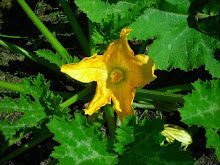It's that time of year again when the dreaded blackfly takes a shine to your runners, french and broad beans, I have some french climbers and noticed their sap sucking presence this morning. My Dad always planted French Marigolds in the bean row and that does have a good affect, it encourages hover fly and other predatory insects fond of aphids, the problem I have is they aren't in flower yet. so I set about squashing them on the plant, this is time consuming and definitely you will miss some.
So what to do, the immediate thought is reach for the chemicals. This is not advised if your plants are in flower as it can affect the pollinators and remember the predators too. Also some chemical controls (systemic) are not to be used on food plants and others are bad for the amphibian and fish population (garden ponds, canals etc), unless you are commercial better to avoid chemicals.
Are there any other remedies out there? Time to reach for the google search.
